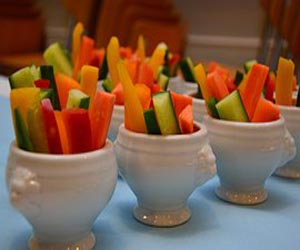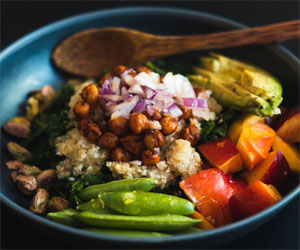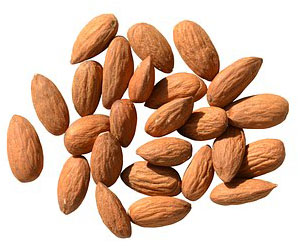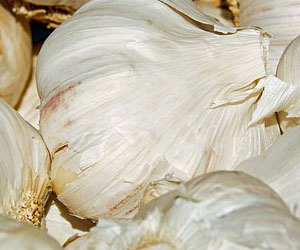


Unleashing The Power Of Cooking Hacks

Cooking is an art, a science, and a delightful experience, but it can also be a time-consuming and complex task. This is where cooking hacks come to the rescue. These ingenious shortcuts and techniques are designed to simplify your time in the kitchen, making meal preparation more efficient, creative, and enjoyable. In this article, we'll explore some cooking hacks that will revolutionize the way you approach your culinary adventures.
1. The Freezer Is Your Ally
Your freezer can be a valuable tool in saving time and reducing food waste. Here are some hacks related to the freezer:
Pre-Chop And Freeze: When you have an excess of fresh herbs or vegetables, chop them up and freeze them in ice cube trays with a little water. This way, you always have prepped ingredients on hand for your recipes.
Make Frozen Herb Butter: Mix chopped herbs with softened butter, roll it into a log using parchment paper, and freeze. Slice off portions to use as needed, adding a burst of flavor to your dishes.
2. Citrus Zest Enhancement
To enhance the flavor of your recipes with citrus zest, consider these hacks:
Pre-Zest And Store: Zest your citrus fruits before you use them, and store the zest in an airtight container in the freezer. It retains its freshness and can be used straight from the freezer.
Zest In Ice Cubes: You can also freeze zest in ice cube trays with a small amount of water. Then, simply pop out a cube when needed.
3. Faster Fruit Ripening
Do you need to ripen your fruits quickly? Try this hack:
Ripen In A Paper Bag: Place unripe fruits like avocados or bananas in a paper bag and fold it closed. The ethylene gas they produce will speed up the ripening process.
4. Masterful Microwave Cooking
Your microwave isn't just for reheating leftovers. Use it to simplify your cooking in these ways:
Lemon And Lime Softening: Before squeezing lemons or limes, microwave them for a few seconds. This makes it easier to extract more juice.
Easy Garlic Peeling: Microwave garlic cloves for 15 seconds to make peeling a breeze.
5. Silica Gel Saver
Don't throw away those silica gel packets that come with packaged foods or electronics. These can be used to keep moisture out of your salt and sugar shakers to prevent clumping.
6. Faster Breakfast Cooking
Mornings can be hectic, so these breakfast hacks can be real time-savers:
Make-Ahead Smoothie Packs: Prepare smoothie ingredients in advance and store them in individual bags in the freezer. In the morning, just blend and go.
Overnight Oats: Combine oats, milk, and your choice of toppings in a jar or container the night before, and you'll have a nutritious breakfast ready to eat in the morning.
7. Perfect Pancakes And Eggs
When cooking pancakes or eggs, use these hacks for better results:
Egg Rings: To make perfectly round fried or poached eggs, use metal egg rings, ensuring a consistent shape every time.
Bottle Pancake Mix: Store pancake batter in an empty ketchup bottle for easy and mess-free pouring.
These cooking hacks can simplify your culinary life and make the kitchen a place of creativity and joy rather than stress and frustration. Incorporate these tips into your cooking routine, and you'll be amazed at how much more efficient and enjoyable your time in the kitchen can become.
 Observation Of Thoughts: Mindful living entails observing your thoughts as they arise, acknowledging them, and then gently letting them go, rather than becoming entangled in them.
Observation Of Thoughts: Mindful living entails observing your thoughts as they arise, acknowledging them, and then gently letting them go, rather than becoming entangled in them.
Savoring Experiences: It encourages you to savor the simple joys of life - from the taste of your morning coffee to the warmth of the sun on your skin.
The Stress-Reducing Benefits Of Mindful Living:
Stress Management: By cultivating mindfulness, individuals can better cope with stress. It helps them break free from the cycle of worry and rumination, providing a sense of calm and relaxation.
Improved Emotional Well-Being: Mindful living promotes emotional balance and resilience. It allows individuals to observe their emotions without reacting impulsively, fostering emotional stability.






Nurturing The Soul
 The Essence Of Emotional Well-Being
The Essence Of Emotional Well-Being
Emotional well-being encompasses the ability to understand, express, and manage our emotions effectively. It's about finding a balance that allows us to navigate life's challenges with resilience, experiencing joy, and finding solace in moments of sorrow. Essential oils, through their natural aromatic compounds, can become powerful allies in this emotional journey.
Aromatherapy's Emotional Arsenal
Aromatherapy, the practice of using essential oils for therapeutic purposes, recognizes the intimate connection between our sense of smell and the limbic system, which governs our emotions. Certain essential oils have distinct properties that can help with various emotional states.
Lavender: Often hailed as the universal oil, lavender is known for its calming and soothing effects. It can help reduce anxiety, stress, and promote relaxation.
Citrus Oils (e.g., Orange, Lemon, And Grapefruit): These oils are uplifting and refreshing, making them ideal for boosting mood and alleviating feelings of sadness or melancholy.
Chamomile: Both Roman and German chamomile varieties are known for their ability to ease irritability, reduce anger, and promote a sense of inner peace.
Frankincense: Renowned for its spiritual and grounding properties, frankincense can aid in meditation and emotional healing, making it a valuable tool for finding inner serenity.
Managing Stress And Anxiety
One of the most prevalent emotional challenges in today's fast-paced world is stress and anxiety. Essential oils can be powerful stress relievers, helping to calm the mind and reduce the physical and emotional tension associated with these conditions. Creating a calming ambiance with oils such as lavender, chamomile, and frankincense can offer much-needed respite from the chaos of daily life.
 Meditation As A Stress Relief Method: Meditation is a mental and emotional exercise that focuses on bringing awareness to the present moment. It encourages individuals to let go of the past and future, allowing them to be fully engaged in the here and now. This practice promotes relaxation, reduces the body's stress response, and fosters a sense of calm and balance.
Meditation As A Stress Relief Method: Meditation is a mental and emotional exercise that focuses on bringing awareness to the present moment. It encourages individuals to let go of the past and future, allowing them to be fully engaged in the here and now. This practice promotes relaxation, reduces the body's stress response, and fosters a sense of calm and balance.
Benefits Of Meditation For Stress Relief:
Reduced Cortisol Levels: Cortisol is a stress hormone produced by the body. Studies have shown that regular meditation can lower cortisol levels, helping to reduce stress and its adverse effects on the body.
Improved Emotional Regulation: Meditation encourages a non-judgmental awareness of emotions. By observing emotions without reacting impulsively, individuals can enhance emotional regulation and reduce the intensity of negative emotions associated with stress.
Enhanced Relaxation: The practice of mindfulness meditation, in particular, triggers the body's relaxation response. By focusing on the breath and the present moment, it reduces stress levels and promotes relaxation.
Improved Mental Clarity: Meditation enhances mental clarity by decluttering the mind. It provides a clear space for focused thinking and problem-solving, which is often hindered by stress.
Emotional Well-Being: Regular meditation can lead to a more positive outlook on life, increased feelings of gratitude, and enhanced emotional well-being, all of which contribute to stress relief.
Incorporating Meditation Into Your Routine:
Start With Short Sessions: If you're new to meditation, start with short sessions, such as 5-10 minutes, and gradually extend the duration as you become more comfortable with the practice.
Choose A Comfortable Location: Find a quiet and comfortable place to meditate where you won't be disturbed.






Nurturing Natural Defenses
 Herbal Medicine And Immune Support
Herbal Medicine And Immune Support
Herbal medicine, also known as phytotherapy, involves the use of plants and plant-based compounds to prevent and treat various health conditions. Many herbs are valued for their potential to modulate the immune system, enhancing its capacity to defend the body against infections and diseases.
Immune-Boosting Herbs
Several herbs have gained recognition for their immune-boosting properties. Some of the most notable include:
Echinacea (Echinacea Purpurea): Echinacea is renowned for its potential to stimulate the immune system, making it a popular choice for preventing and treating colds and upper respiratory infections.
Astragalus (Astragalus Membranaceus): Astragalus is an adaptogen that can enhance the body's resistance to stress, boost the immune system, and support overall vitality.
Garlic (Allium Sativum): Garlic is celebrated for its antimicrobial properties and its ability to stimulate the immune response. It has been used to ward off infections and promote overall health.
Ginseng (Panax Ginseng): Ginseng is an adaptogenic herb that can improve the body's ability to handle stress and support the immune system's response to infections.
Turmeric (Curcuma Longa): Curcumin, the active compound in turmeric, possesses potent anti-inflammatory and antioxidant properties. It may help regulate the immune response and reduce inflammation.
Medicinal Mushrooms (e.g., Reishi, Shiitake, Maitake): Certain medicinal mushrooms have immunomodulatory effects and are used to enhance the body's defense mechanisms.
The Science Of Herbal Immune Support
Modern scientific research has delved into the mechanisms by which herbal remedies influence the immune system. For example, Echinacea is believed to stimulate the production of white blood cells, while astragalus can enhance the activity of immune cells such as macrophages and natural killer cells. These studies help provide a scientific basis for the use of herbal medicine in immune support.
Safety And Consultation
While herbal remedies can offer valuable support for the immune system, it's essential to use them responsibly. Herbal preparations should be selected and used under the guidance of a knowledgeable healthcare practitioner, especially if you have underlying health conditions or are taking medications.
Cultivating A Fulfilling Life
 Embracing The Present Moment: Mindfulness teaches us to be fully present in each moment. Gratitude complements this by encouraging us to recognize and appreciate the small yet precious details of life - the warmth of the sun on our skin, the laughter of loved ones, or the taste of a delicious meal. By savoring these moments, we become more attuned to the richness of the present.
Embracing The Present Moment: Mindfulness teaches us to be fully present in each moment. Gratitude complements this by encouraging us to recognize and appreciate the small yet precious details of life - the warmth of the sun on our skin, the laughter of loved ones, or the taste of a delicious meal. By savoring these moments, we become more attuned to the richness of the present.
Shifting Perspective: Gratitude encourages us to shift our perspective from what we lack to what we have. This change in mindset can be a powerful tool in mindfulness. When we focus on the positive aspects of our lives, we reduce stress and anxiety, creating a mental space where we can truly live in the moment.
Enhancing Emotional Well-Being: Regularly practicing gratitude has been linked to improved emotional well-being. It helps regulate emotions, reduce negative feelings, and increase overall happiness. In a state of mindfulness, we are better equipped to process our emotions and respond to them with greater clarity and balance.
Strengthening Relationships: Gratitude is not limited to recognizing the beauty in our surroundings but also extends to the people in our lives. Expressing gratitude towards friends, family, and colleagues fosters deeper connections and nourishes the bonds we share. Mindfully acknowledging the importance of these relationships adds richness to our journey.
Cultivating Resilience: Mindfulness and gratitude together can be powerful tools for building resilience. When we encounter challenges and setbacks, the practice of gratitude enables us to find silver linings even in adversity.